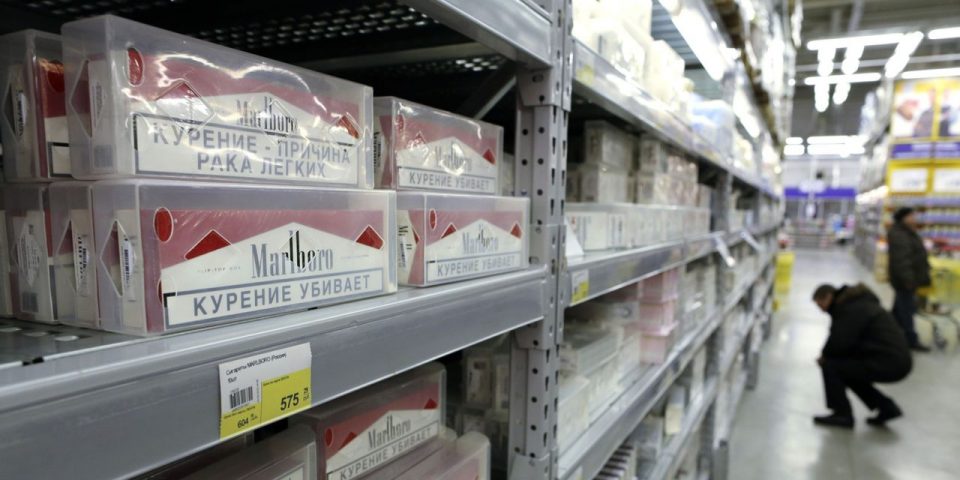Text size

Cartons of Marlboro cigarettes inside a Lenta LLC supermarket in Russia
Andrey Rudakov/Bloomberg
Sanctions by the U.S. and its allies on Russia’s economy following the invasion of Ukraine have prompted a major exodus of Western businesses. Losing the Russian market could mean less revenue and profits for some companies, but the wider direct impact on the U.S. corporate fundamentals will be limited.
Still, the recent selloff in the U.S. has been broad. The
S&P 500 has declined almost 7% since mid-February, when a Russian invasion of Ukraine appeared inevitable. Those stock drops have come as prices of crude oil, natural gas, and several metals agricultural commodities have soared.
The raw materials are an input for a plethora of companies both near and far from Russia. Some on Wall Street are also worried about the impact on consumer demand if Americans are feeling more pain at the pump.
High commodity prices will eventually self-correct, as more supply comes online in countries other than Russia, and businesses adapt. Oil futures imply the oil price will be 30% lower at year end, according to data from CME Group, from current levels approaching $130 a barrel. And companies more than ever before have gained experience securing alternative sources of supply thanks to the U.S.-China trade war and Covid-19 pandemic.
There’s less of a clear path to the eventual removal of Western sanctions on Russia’s economy. Rhetoric from President Vladimir Putin suggests little chance of a negotiated withdrawal on terms Ukraine, the U.S., and its allies would accept. It’s much easier to apply sanctions than it is to imagine them lifting.
Western businesses may have to effectively say “do svidaniya” to their Russian revenue for the foreseeable future. Russian partners and suppliers might be targeted by sanctions, or limits on transacting with Russian banks could make financing and conducting business in the country impractical.
Many Western companies have voluntarily cut their ties with Russia in the past few weeks, or announced their intentions to do so. Those moves range from the largely symbolic—
Walt Disney
(DIS) won’t show new movies in Russia anymore—to the more impactful—
BP
(BP) is walking away from a stake in Rosneft it valued at $14 billion last year.
The good news for U.S. investors is that the world’s 11th-largest economy is actually a very minor contributor to corporate revenue and profits. The S&P 500 generates less than 1% of its annual sales from Russia, according to FactSet.
The most exposed in the index is cigarette-maker
Philip Morris International
(ticker: PM), which reported 8% of revenue from Russia last year. “Our primary concern is the safety and security of our colleagues and their families, and we are monitoring the situation closely,” the company said on Feb. 23. “At this time, we do not anticipate any material impact on our business related to the announced sanctions.”
Other U.S. firms with material revenue exposure to Russia include
McDonald’s
(MCD) at 4.5%,
PepsiCo
(PEP) at 4.3%,
EPAM Systems
(EPAM) at 4.1%, and
Mondelez International
(MDLZ), at 3.1%—all per data from FactSet.
Here are several U.S. companies that generated at least one percent of their 2021 sales in Russia:
| Company / Ticker | % of 2021 Sales From Russia | Return Since 2/24 | Return vs. S&P 500 since 2/24 |
|---|---|---|---|
| Philip Morris International / PM | 8.0% | -8.2% | -6.3% |
| McDonald’s / MCD | 4.5% | -7.5% | -5.0% |
| PepsiCo / PEP | 4.3% | -1.5% | -0.1% |
| EPAM Systems / EPAM | 4.1% | -54.9% | -51.8% |
| Mondelez International / MDLZ | 3.1% | -4.8% | -3.2% |
| Liberty Formula One / FWONA | 4.0% | -10.1% | -8.2% |
| Viatris / VTRS | 2.0% | -29.0% | -26.6% |
| Bumble / BMBL | 2.0% | 35.2% | -33.2% |
| Ingersoll Rand / IR | 2.0% | -8.8% | -6.0% |
| AGCO / AGCO | 2.0% | 4.1% | 6.0% |
| CNH Industrial / CNHI | 2.0% | -0.2% | 1.8% |
| Coty / COTY | 2.0% | -13.8% | -11.8% |
| Booking Holdings / BKNG | 2.0% | -19.4% | -17.4% |
| Electronic Arts / EA | 1.0% | -2.6% | -0.5% |
| Magna International / MGA | 1.0% | -22.7% | -20.7% |
Source: FactSet, company filings
Those firms’ Russian revenue won’t all go away overnight. But their management teams certainly have more to think about these days.
Write to Nicholas Jasinski at [email protected]


